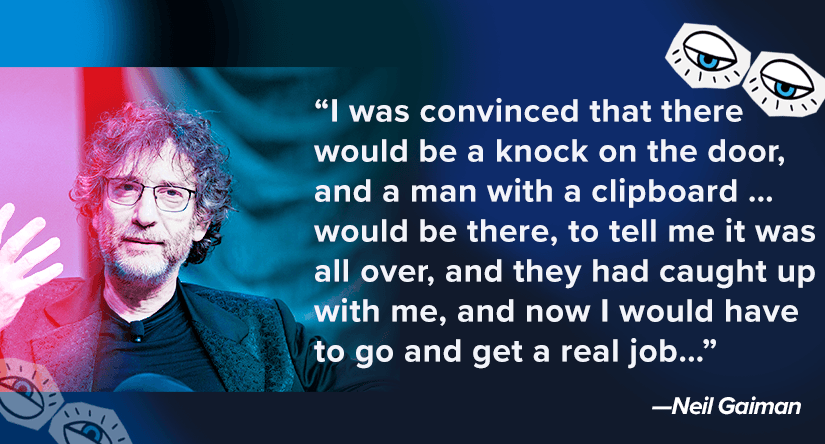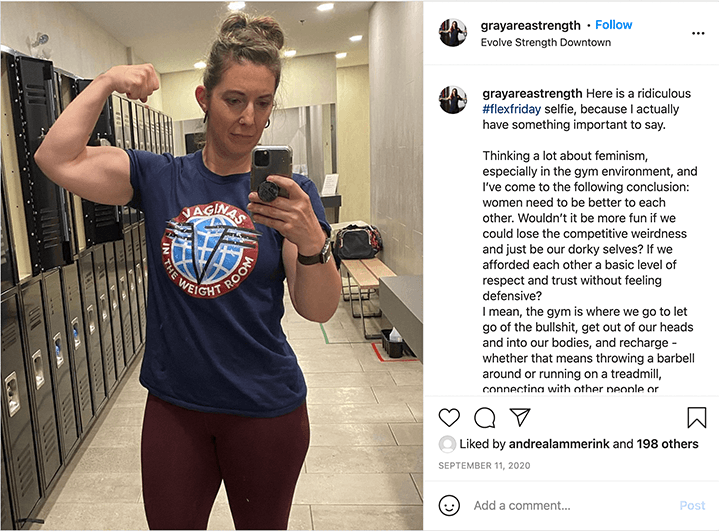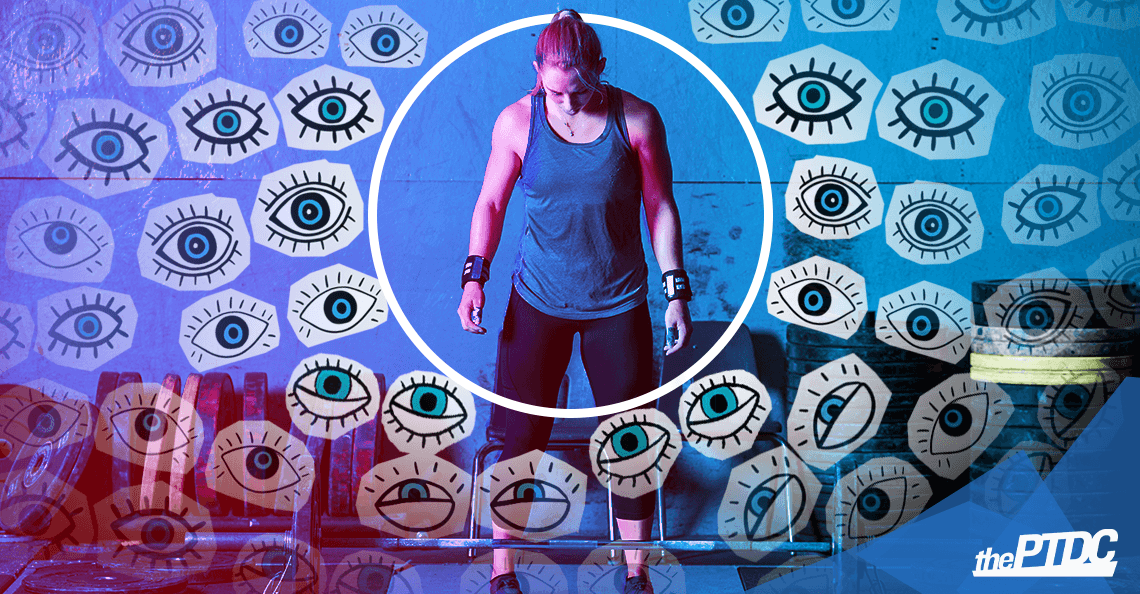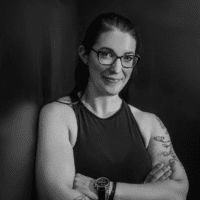I know I’m not an impostor in the training world.
But I still feel like one from time to time.
I’ve been a personal trainer for 16 years, with a list of certifications as long as my arm.
I push myself to stay educated and I love to train hard. I compete at the international level in powerlifting and Olympic weightlifting.
But I’m also 44 years old, with two teenage kids, and I’m acutely aware that the mileage is showing.
Which makes me wonder:
Do I even belong here?
Do I deserve the success I’ve had?
Why am I still not good at this?
The impostor syndrome is real, friends. And it never goes away.
But here’s the thing: I don’t see impostor syndrome as a drawback. My impostor syndrome keeps me plowing forward and working to be better every day. (And if you ask me, anyone who doesn’t feel impostor syndrome once in a while is not to be trusted!)
I think if we frame it properly, it can be a source for good, as long as we stay a little detached from its negative effects and we don’t let it take over.
Here’s how I do that …

Most people suffer impostor syndrome from time to time—even world-class weightlifters like the author.
How to deal with impostor syndrome: A fitness professional’s guide
Know you’re not alone
Those impostor feelings you have? They’re common and nothing new.
The term has been around since 1978, coined by psychologists Pauline Rose Clance and Suzanne Imes. It applies to individuals who feel like their successes are owed to luck, help from others, or circumstances beyond their control.
In short, they feel they’re frauds, undeserving of their achievements.
The term was originally attributed exclusively to high-achieving women. But research shows impostor syndrome is part of the human experience for as many as eight in 10 people.
Even the famed author Neil Gaiman once wrote:

Dr. Clance, in her 1985 book The Impostor Phenomenon, wrote that the syndrome is usually rooted in childhood and driven by a fear of failure. Common symptoms: procrastination, obsessive behavior, even clinical anxiety and depression if left unchecked.
Think about it: We grow up viewing ourselves from the inside; keenly aware of our own deeply flawed nature.
But all we see of others is their carefully polished exterior. Our inevitable conclusion is that they are all way better than us—clearly they don’t suffer the agony, insecurity, fear, regret, or sexual kinks that we have to cover up!
In the fitness business, it’s especially true. We’re supposed to look the part and be brimming with motivation.
But get this: Impostor syndrome is even more common among those with experience and legitimate qualifications. A cocky, clueless newcomer, in other words, won’t (can’t, actually) feel like an impostor.
In other words—the better you are, the more doubts you may have. Take it as a good sign!
Stop comparing yourself to social media influencers
Hands up: How many of you have idly opened Instagram, only to surface 90 minutes later, wracked with self-doubt and wondering what happened to your afternoon—or for that matter, your whole life?
I see a lot of hands up. (Mine included.)
The fitness industry is essentially unregulated. That’s awesome—and exasperating. It helps create a cesspool of narcissism and impostor syndrome.
We trainers have an infinite range of abilities, beliefs, and opinions. Nowhere is this more apparent than on social media. Pity the poor client looking for trustworthy, credible information in that roiling cesspool.
So it’s no surprise that the ones who think in black and white—who are absolutely sure they have it figured out—tend to grow huge followings.
But that’s okay, for two reasons:
- Having a huge following has nothing to do with being a great coach. Your knowledge, communication skills, and empathy are far more important for attracting and keeping clients.
- You can actually learn from those people: Confidence. Polish.
When I look at Instagram and I see a trainer with a great body, youthful good looks, and unwavering confidence in how others should live, I think of how I could deliver a more specific, more relevant message to my potential clients.

Focus on being your unique, engaging, rad self and you might not attract a million people, but you will attract the right people.
(Learn how to promote personal training on Instagram—without getting half naked.)
Use your impostor syndrome as motivation
The impostor syndrome can spur us forward, driving us to learn and be the best at what we do.
That’s been my experience. I’m always plowing forward and working to be better every day. In the past three years, I’ve spent about $30,000 on continuing education.
Why? Because it’s fun and it keeps my inspiration-fire stoked.
Moreover, despite my 16 years of experience, I know my academic credentials don’t match up with many—even compared to student trainers doing their practicum hours under my supervision.
Lifelong learners who are inquisitive and engaged will get good at what they do. But someone who earns an advanced degree and thinks, “Now I know everything” will be a lousy trainer.
We’ve all had clients who say that someone—a doctor, nurse, or physiotherapist—told them not to work with a trainer. In fairness, those professionals don’t know if their patient will end up with a random gym bro or a true professional.
I want to be that reliable, well-informed professional.
We trainers should be considered an integral part of the health-care continuum. If a little impostor fear leads to a lot of learning, that’s better for all of us.
Most of us are inspired by the genuine desire to help others, and we wear a lot of hats: coach, teacher, confidante, leader, cheerleader, information source.
It is impossible to get it right all the time. Mistakes are inevitable (I still cringe at my early-career mistakes) but they are learning opportunities if we are open to them.
Separate feelings from facts
Feel like you’re out of your depth? Take a second and fact-check yourself.
Are you really? Maybe you are, but that is a learning opportunity. (BTW, admitting that you don’t know something is a good answer when you get that feeling.)
But it’s more likely that you’re not out of your depth, and it’s that snake oil salesman on Instagram who confidently doles out terrible advice who is actually out of his depth.
Don’t let the internal chatter take over—your thoughts aren’t facts.
Case in point: Want to hear a true story about a time I felt like an impostor? I realized something that might help you too …
Reframe your negative thoughts
Next time you feel like you’ve duped everyone into thinking you’re an expert, stop!
Tell yourself, “Whoops, impostor thought” and move on. Or try re-framing those thoughts in a more positive way:
Instead of “I’m a fake,” try “This is new for me.”
Instead of “I’m not smart enough to be here,” try “I am learning and growing.”
Instead of “I’m not fit enough to be a trainer,” try “I am on the same path with the people I coach.”
Ruminating will only make it worse. Don’t give it power over you.
Think about it: Does complaining about feeling tired ever help? Did it make you feel more energetic? Or more tired?
Same with impostor syndrome. If we validate it and stew about it, we’re just using up valuable resources that could be better spent focusing on something more engaging, like learning a new skill or helping others.
Michelle Obama said it well in a speech:
Think less, act more
If we give in to impostor syndrome, then we’ve accepted that it’s okay not to try: If I’m just a poser then what’s the point? What do I have to offer?
Feelings are the last thing to change. How you act must lead the way.
You don’t have to feel confident to act confident. And the more you practice acting confident the more ingrained that behavior will become.
Consider this: Who do you want to be? How does that awesome version of you act? Think? Feel?
If you practice being that person, then feeling like that person will follow.
Wait, you might say—isn’t acting a form of faking it? You know, like an impostor would?
Remember, successful people we look up to often suffer from impostor syndrome—they have the same doubts and fears and insecurities as the rest of us.
The difference is in how they deal with it. Do they let doubt and fear take over, and run away and hide? Or do they set the impostor feelings aside and get the job done?
Acting confident is not “acting,” it’s a skill. It takes practice and repetition to develop.
The truth: Outwardly successful people often are wracked with self-doubt. They trip over their own feet, lust after people they shouldn’t, and their stomachs make weird gurgling sounds at inopportune times, just like the rest of us.
So what are we to do with these thoughts and feelings when they crop up?
For example, imagine that you’re about to talk to an audience of 100 of your peers. Nervous, right?
What if you trip over the mic cord and sneeze-fart? Do you make a joke and get on with kicking ass at your presentation? Or do you let it derail you by telling yourself that you don’t belong there? As if nobody else has ever tripped or sneeze-farted?
You know the answer. Give your speech and take your bow.













